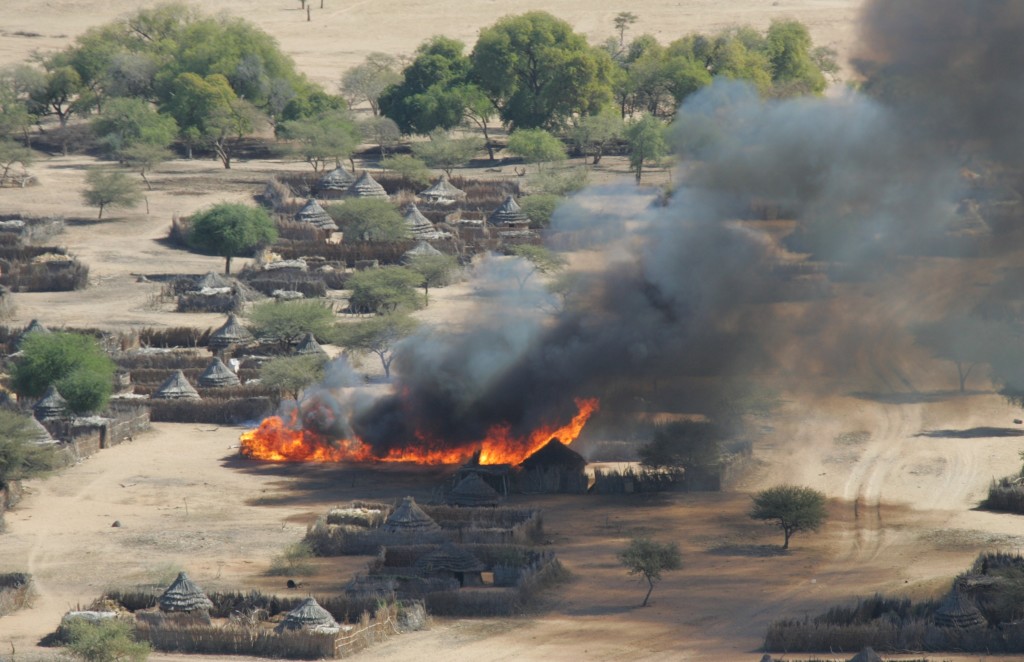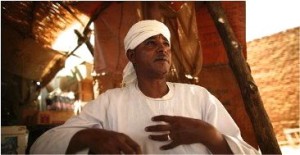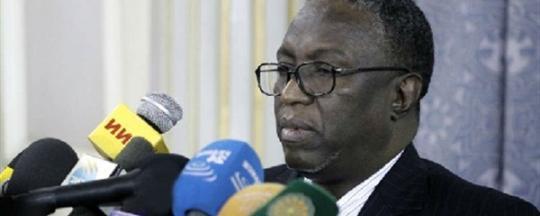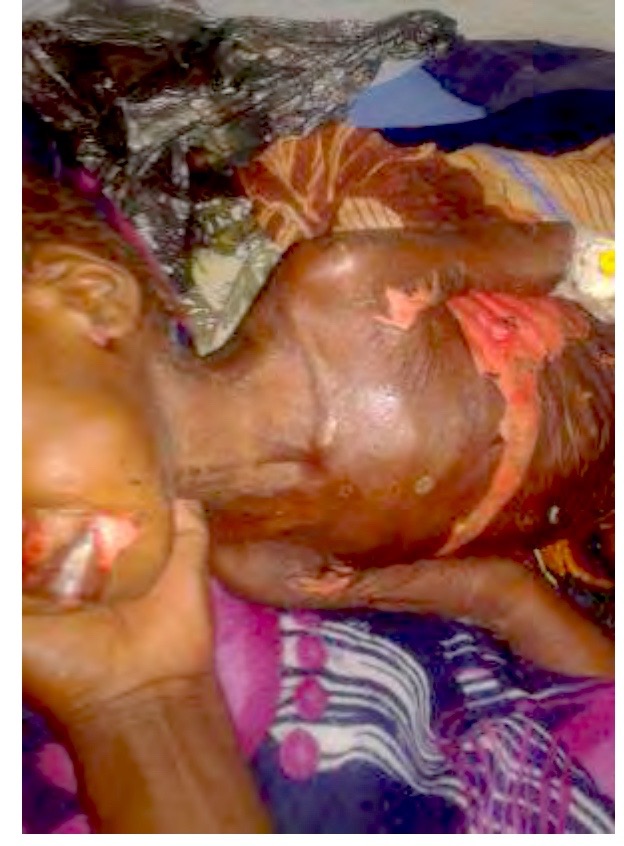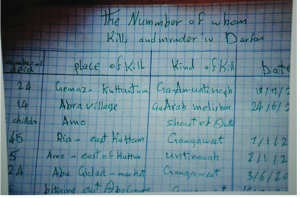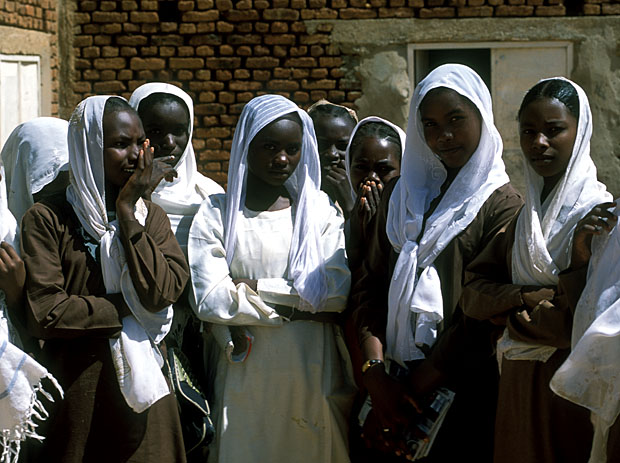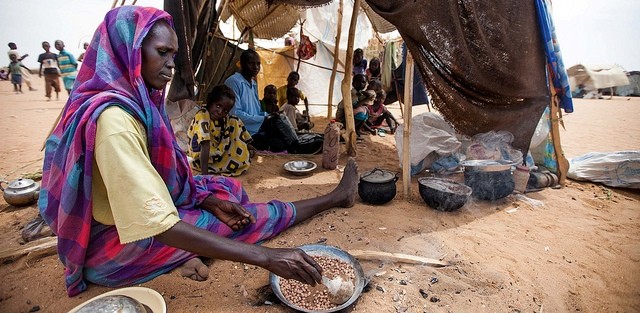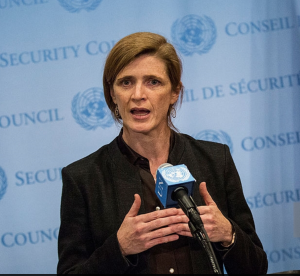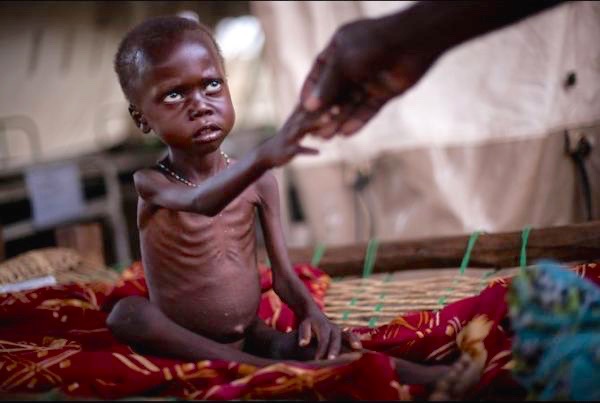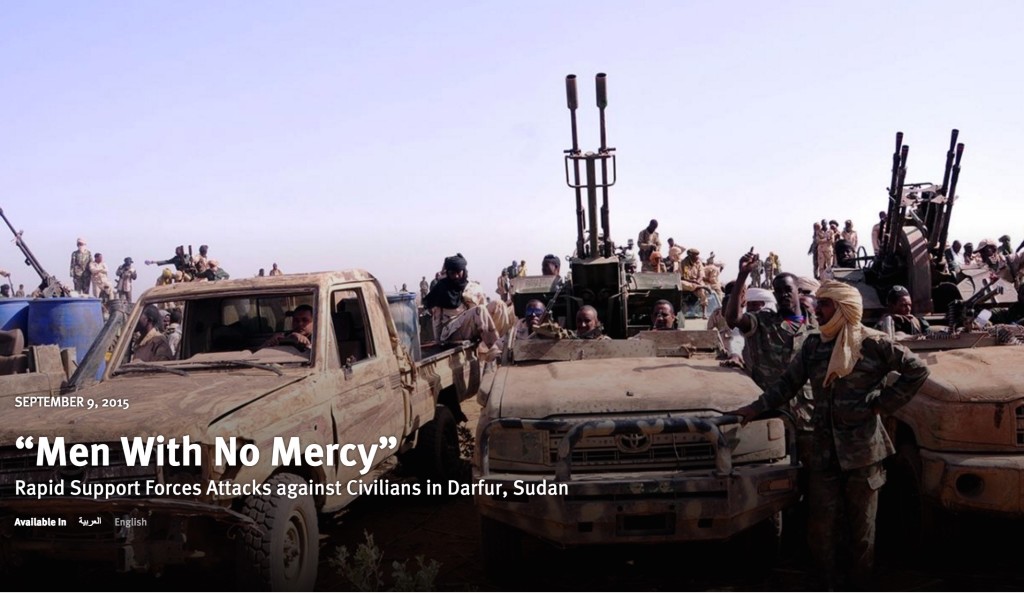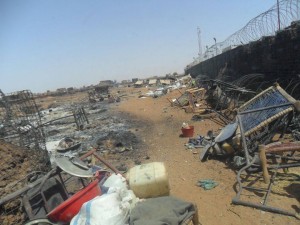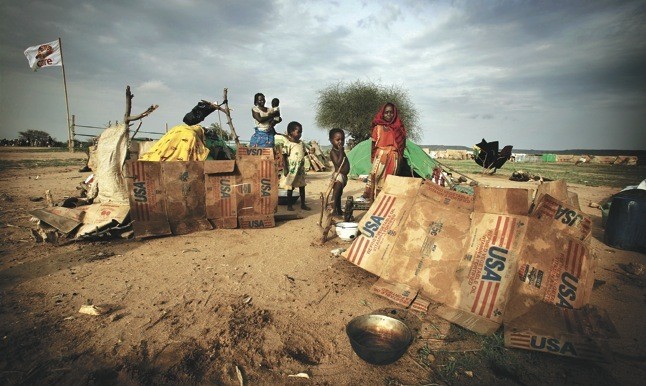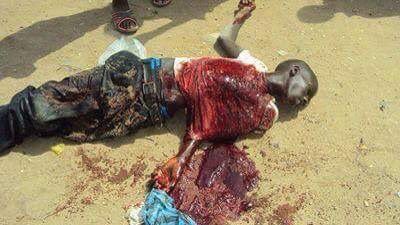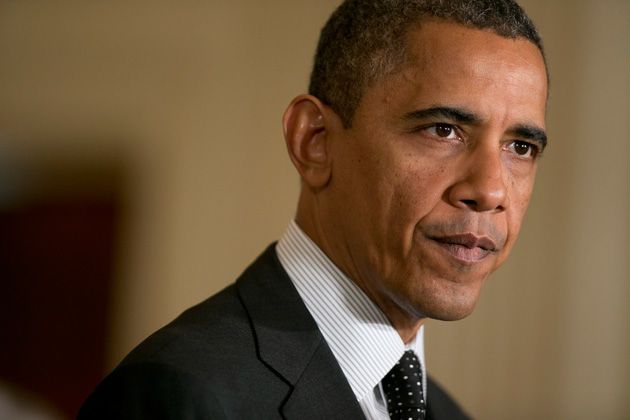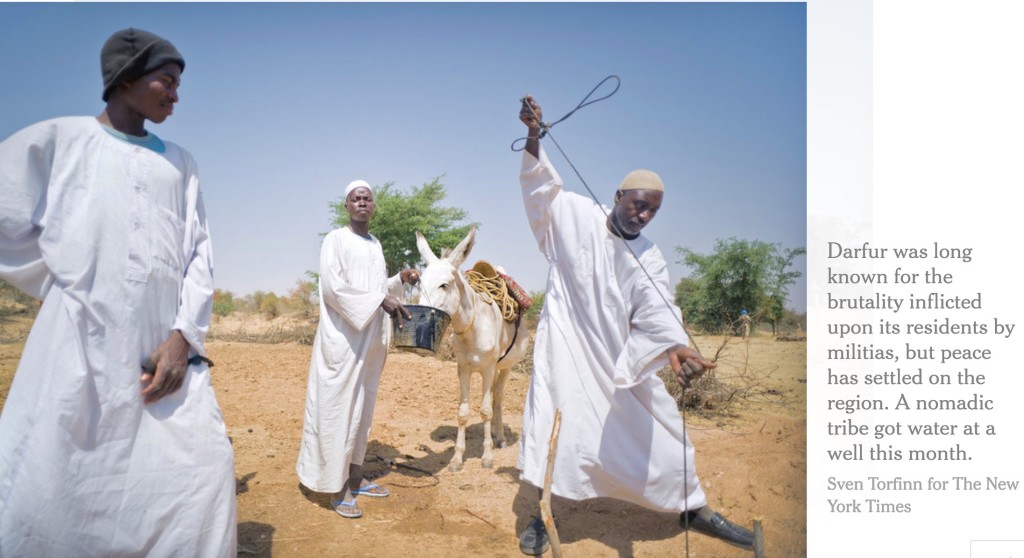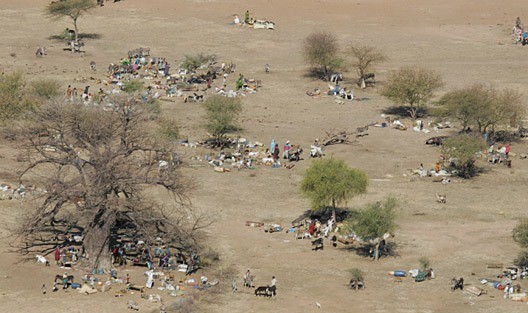Darfur, Now the Most “Successful” Genocide in a Century—and “on our watch”
The region’s increasingly powerful “militia state” marks the victorious culmination of fourteen years of ethnically-targeted violence and destruction
Eric Reeves | April 17, 2017 | http://wp.me/s45rOG-7849
Two dispatches over this past weekend offer powerful insight into the the final form of the Darfur genocide—recognized as such since 2004 by dozens of political officials and bodies (including the U.S. Congress and the EU Parliament), human rights groups, a wide range of genocide and human rights scholars, and such commemorative bodies as the U.S. Holocaust Memorial Museum and Vad Yashem in Israel (for an extensive but still partial list of those declaring Darfur to be the site of genocide, see | http://wp.me/p45rOG-22A/).
Darfur in 2005: a searing, iconic photograph taken by Brian Steidle, a military observer with the feeble African Union Mission in Darfur, the predecessor to UNAMID
The annihilating character of attacks on non-Arab/African civilians and villages in Darfur; the systematic denial of humanitarian aid to these ethnic populations; and the pointed pronouncements of various officials and proxies of the National Islamic Front/National Congress Party regime—all made “genocide” the inevitable characterization. Only political diffidence or disingenuousness kept the characterization from being universally accepted.
The outlines of the genocidal ambition were articulated with remarkable clarity in a memorandum originating from the headquarters of notorious Janjaweed leader Musa Hilal in Misteriya, North Darfur at the height of the violence. Julie Flint and Alex de Waal were among those who reported on this extraordinary memorandum:
The ultimate objective in Darfur is spelled out in an August 2004 directive from [Janjaweed paramount leader Musa] Hilal’s headquarters: “change the demography” of Darfur and “empty it of African tribes.” Confirming the control of [Khartoum’s] Military Intelligence over the Darfur file, the directive is addressed to no fewer than three intelligence services—the Intelligence and Security Department, Military Intelligence and National Security, and the ultra-secret “Constructive Security,” or Amn al Ijabi. (Julie Flint and Alex de Waal, Darfur: A Short History of a Long War, Zed Books, 2005) (all emphases in quoted passages in bold have been added—ER)
The notorious Musa Hilal, whose spirit lives on in the Rapid Support Forces (RSF) described so comprehensively by Human Rights Watch
Lest we think Musa Hilal as only a “man of letters,” we should recall that he was identified by numerous eyewitnesses as having presided at the February 2004 slaughter at Tawila, North Darfur. More than 100 people were killed, 350 girls and women were abducted, and more than 100 women were raped. A number of the women and girls were raped in front of their fathers, who were then killed (see | http://www.sudantribune.com/spip.php?article11358/). This was Musa Hilal’s idea of “demographic change.” And this was only one of many atrocities that he either directed or orchestrated.
In September 2015 Human Rights Watch provided the world a clear, authoritative, and deeply researched report on the Rapid Support Forces (RSF), by then the dominant militia force in Darfur, called by some the “new Janjaweed” (“Men With No Mercy: Rapid Support Forces Attacks Against Civilians in Darfur, Sudan” | September 9, 2015 | https://www.hrw.org/report/2015/09/09/men-no-mercy/rapid-support-forces-attacks-against-civilians-darfur-sudan/). This report is more important than ever as we survey the “militia state” that Darfur has become; and the report provides compelling evidence that Musa Hilal’s ambitions continue to animate the violence orchestrated by the Khartoum regime against non-Arab/African tribal populations. The voice of particular significance in this report is that of Vice President of the regime, Hassabo Mohammed Abdel Rahman:
Ahmed, a 35-year-old officer in the Border Guards [another of Khartoum’s powerful militia proxies in Darfur], spent two weeks at a military base in Guba in December 2014 before being sent to fight rebels around Fanga. Two senior RSF officials, the commanding officer, Alnour Guba, and Col. Badre ab-Creash were present on the Guba base.
Ahmed said that a few days prior to leaving for East Jebel Marra, Sudanese Vice President Hassabo Mohammed Abdel Rahman directly addressed several hundred army and RSF soldiers: “Hassabo told us to clear the area east of Jebel Marra. To kill any male. He said we want to clear the area of insects. … He said East Jebel Marra is the kingdom of the rebels. We don’t want anyone there to be alive.”
Ahmed said he was then given direct orders from Colonel Badre, who explained that they were going to attack the area of Fanga and the orders were to kill all the rebels and all of the civilians because they were supporting the rebels. Badre told the officers that if they found any women they were allowed to do anything they want to them, which Mohamed interpreted to mean rape.
“Hassabo told us to clear the area east of Jebel Marra. To kill any male. He said we want to clear the area of insects. … He said East Jebel Marra is the kingdom of the rebels. We don’t want anyone there to be alive.”
Vice President of the Khartoum regime Hassabo likened the rebels, and their civilian “supporters—overwhelmingly from Darfur’s non-Arab/African ethnic groups—to “insects.” The echoes of Rwanda have not registered in meaningful fashion with those seeking rapprochement with the National Islamic Front/National Congress Party regime, despite its long history of genocidal counter-insurgencies animated by the views Hassabo gives voice to.
I am astonished that these words by Khartoum’s Vice President have not registered in a consequential way with those formulating various policies of accommodation with the regime, particularly since they define so precisely the nature of the violence that accelerated from 2012 through the militarily successful campaign against the Jebel Marra massif in Central Darfur in 2016 | see these short monographs:
“‘Changing the Demography’: Violent Expropriation and Destruction of Farmlands in Darfur, November 2014 – November 2015″ | December 1, 2015 | http://wp.me/p45rOG-1P4
“Continuing Mass Rape of Girls in Darfur: The most heinous crime generates no international outrage” | January 2016 | http://wp.me/p45rOG-1QG
[Arabic translation of this report | http://wp.me/p45rOG-1Rr ]
The Jebel Marra campaign, which included the use of chemical weapons against clearly civilian populations in the region, denied rebels forces in Darfur their last significant military redoubt. The genocidal counter-insurgency has—after fourteen years of unspeakable violence, destruction, and deprivation—has succeeded.
The use of chemical weapons against children seems to matter in Syria—not in Darfur, despite overwhelming evidence of such use assembled by Amnesty International (“Scorched Earth, Poisoned Air: Sudanese Government Forces Ravage Jebel Marra, Darfur,” September 2016 | http://www.amnestyusa.org/research/reports/scorched-earth-poisoned-air-sudanese-government-forces-ravage-jebel-marra-darfur
In the wake of such victory, Khartoum is eager to begin dismantling the camps for displaced persons that have done so much to define destruction and suffering during the Darfur genocide. UN figures suggest that approximately 3 million people remain displaced from their homes, some 300,000 as refugees in eastern Chad (see | http://sudanreeves.org/2017/03/19/internally-displaced-persons-in-darfur-the-invisible-catastrophe/). They are overwhelmingly people from the non-Arab/African tribal populations of Darfur. Extant mortality data and reports, while limited in many ways by Khartoum, when aggregated strongly suggest that well over 500,000 people have been killed directly or indirectly by the violence Khartoum has so effectively orchestrated (see | http://sudanreeves.org/2017/01/05/quantifying-genocide-darfur-mortality-update-august-6-2010/).
Since the world seems not to care about the number of violent deaths in Darfur, desperate Darfuri refugees in eastern Chad have attempted to keep at least some records of the human destruction
Many tens of thousands of girls and women have been raped as sexual violence continues to be deployed as a brutal weapon of war (see | http://sudanreeves.org/2017/03/07/continuing-mass-rape-of-girls-in-darfur-the-most-heinous-crime-generates-no-international-outrage-january-2016//).
Non-Arab/African girls and women of marriageable age have been, overwhelmingly, the targets of a brutal deployment of rape as a weapon of war in Darfur. Many of the girls raped and gang-raped are under the age of ten, often in front of their families.
Deprivation is unspeakable in many locations; indeed, the best estimate is that 30 percent of the population in Darfur that remains inaccessible to humanitarian relief operations because of Khartoum’s obstructionist policies. This represents a population of almost 1 million people, as the UN has recently estimated that Darfur’s population in need is 3.3 million people (UN OCHA, Sudan Bulletin 6 | February 2017 | http://reliefweb.int/report/sudan/sudan-humanitarian-bulletin-issue-6-13-26-february-2017-enar/).
Some of the Darfuris who fled their homes in 2014 as the Rapid Support Forces swept through their villages. Violence from 2014 through 2016 was as intense as that of the early years of the genocide (2003 – 2005), making nonsense of claims by UNAMID heads Gambari and Adada about reductions in violence. These are some of the 3.3 million people that OCHA estimated in February 2017 were in need of humanitarian assistance.
I offer in a recent analysis representative examples of camps and locations that remain inaccessible despite the claim by former U.S. Ambassador to the UN Samantha Power that there has been a “sea change” of improvement in humanitarian access in Sudan. This is a preposterous falsehood, and yet it stands uncorrected by any U.S. government official—past or present. It is a particularly outrageous falsehood, given the fact that in addition to obstructing humanitarian relief in Darfur, Khartoum continues to impose a total humanitarian blockade on the large and highly distressed populations in rebel-controlled areas of South Kordofan and Blue Nile. By crediting Khartoum with a “sea change” of improved humanitarian access, Power’s statement perversely works to diminish incentives for the regime actually to make such improvements.
Former Obama administration Ambassador to the UN Samantha Power; she claimed that there has been a “sea change” of improvement in humanitarian access in Sudan. There has been no public correction of her egregious falsehood by any official of either the Obama administration or the Trump administration. In short, her statement stands as the most prominent U.S. government assessment of this critical issue, affecting literally millions of human beings in Darfur, South Kordofan, and Blue Nile.
All this makes clear that, given the terms set by President Obama for a permanent lifting of U.S. sanctions on Khartoum—which include prominently an improvement in humanitarian access—the regime is failing badly (see my recent assessment of Khartoum’s failure to adhere to the terms stipulated | http://wp.me/p45rOG-22o/).
The badly malnourished child in the Nuba Mountains of South Kordofan has seen nothing of the “sea change” in humanitarian access Ambassador Power spoke of. Dr. Tom Catena, the only surgeon working in the Nuba Mountains, has written to me repeatedly to insist that “not a grain of sorghum, not a bit of medicine” has reached the people he serves from his hospital near Kauda.
What does Darfur look like in the wake of this ghastly “success”?
The character of Khartoum’s success in Darfur is revealed in two dispatches from Radio Dabanga this past weekend (see below) and a recent report from the Enough Project (“Border Control from Hell: How the EU’s migration partnership legitimizes Sudan’s militia state” | April 2017 | http://www.enoughproject.org/files/BorderControl_April2017_Enough_Finals.pdf/). What they have in common is the characterization of the region as a “militia state,” one in which security has essentially been turned over to the militia forces that have fought for Khartoum and which will sustain themselves primarily by continuing predations on civilians and permanent, violently ensured expropriation of farmlands and pasturage.
This Human Rights Watch report is our definitive account of the savage predations of the Rapid Support Forces through September 2015; see also my monograph on the RSF and other militia forces in Darfur: “Changing the Demography”: Violent Expropriation and Destruction of Farmlands in Darfur, November 2014 – November 2015″ | December 1, 2015 | http://wp.me/p45rOG-1P4
Hamid Nur, a man known to me as someone of extraordinary knowledge, integrity, and humanity, is reported by Radio Dabanga to have offered the following assessment:
Sudan’s western region is politically, militarily, and economically dominated by militias, says the head of the Darfur Civil Society Platform. The Darfur displaced and refugees have no way to return to their [homes and farms] as the places are occupied by militiamen and their families. In an interview with Radio Dabanga, Hamid Ali Nur, head of the Darfur Civil Society Platform, called the repeated statements by the Sudanese government and the recent report by the US military attaché about the improved security situation in Darfur inaccurate and incorrect.
According to the civil society leader, the Khartoum government has, to a large extent, succeeded in changing the Darfur population itself. “Militiamen and their families have occupied the villages and farms left by fleeing Darfuris during all these years.”
The civil society activist said that the government’s options given to the Darfur displaced, either to return to their villages of origin, or integrate them into the local communities by re-structuring the camps, are fake. “As the displaced are not able to return, Khartoum’s policy is aimed at permanently displacing them from their homes, lands, and heritage.”
The new U.S. military attaché in Khartoum, John Bung, has negligible knowledge of or experience in Darfur, and yet—
According to SUNA, the Military Attaché John Bung said he witnessed great developments in North Darfur, and lauded the coordination between the state and federal security bodies to maintain the security situation in the region. (Radio Dabanga, April 10, 2017 | El Fasher/Tullus)
Of course Military Attaché Bung saw only what Khartoum permitted him to see, and would have been quite unprepared for the manipulations of appearances at which Military Intelligence and the National Intelligences and Security Services (NISS) have become so expert in Darfur. And while there is good reason to be deeply skeptical of the accuracy of the SUNA account—“the news agency” is little more than an extension of the regime’s elaborate propaganda apparatus—the views attributed to Bung comport all too well with U.S. Sudan policy under the Obama administration and so far under the Trump administration.
The angry response of Darfuris to the reported characterization by Bung was made most bluntly and directly by camp officials and displaced persons (Radio Dabanga, “‘Militiamen living in our villages, using our lands’: Darfuri displaced” | April 17, 2017 | BELEIL / ZALINGEI
The continued announcements of the Sudanese government and the recent declaration of the US military attaché in Khartoum about the improved security situation in the region are “false propaganda,” according to the displaced people in Darfur. “These statements about security in Darfur have no basis in reality,” Hussein Abu Sharati, the spokesman for the Darfur Displaced and Refugees Association, commented to Radio Dabanga.
“In terms of security and stability, the situation in Darfur is now more serious than three years ago. As the region is currently under the control of those who fought alongside government forces against the people, and chased them from their villages. The government rewarded them by letting them occupy our lands.”
Abu Sharati explained that the displaced and refugees do not refuse to return voluntarily. “On the contrary, they are longing to return to their places of origin. It is imperative however, to achieve a comprehensive peace, to restore security, disarm the militias, expel the militiamen and their families from the occupied lands, and bring those who have committed crimes against civilians in Darfur to justice.
“Otherwise, we have nothing to do with any re-planning of camps, nor with the so-called voluntary return as it is promoted by the government,” he added.
****************
According to El Shafee Abdallah, Coordinator of the Central Darfur camps and one of the members of the Darfur Camps Coordination Committee, the government’s announcement of security in Darfur and the possibility for the displaced people in the camps to return to their villages is “baseless propaganda.”
“The lands and villages of the displaced people are currently occupied by militiamen, from the region or neighbouring countries, who are allied with the government,” he said. “They daily prevent the displaced from leaving the camps to collect firewood and straw, let alone to return to their villages.”
He explained that “The government aims to keep the displaced people where they are, after a so-called re-planning of the camps.
“If the camp areas are annexed to the towns and the displaced registered as town residents, they will deprived from the possibility to reclaim their land. Thus the way to legalising the new settlers’ ownership of our lands will be paved.”
“That is why the displaced people will never accept the re-planning of the camps and their integration into the towns,” he said.
The inaccurate and distorting characterization offered by Military Attaché Bung will undoubtedly inform and guide U.S. participation in the June 2017 UN Security Council debate on re-authorizing the absurdly expensive and disastrously under-performing UN/African Union “hybrid” peacekeeping force in Darfur (UNAMID). There will be unctuous words about the importance of “protecting innocent civilians in Darfur,” but in the end the U.S. will vote to reduce, and thus weaken, UNAMID. The vote will be justified as the only way in which to avoid a Russian or Chinese veto of UNAMID reauthorization, which is vehemently opposed by Khartoum (the regime is continually demanding of the UN Department of Peacekeeping Operations an “exit strategy” for UNAMID and will insist that there be at the very least significant cuts to the force, an insistence that will be supported by Russia and/or China).
As the debate about the need to reauthorize UNAMID nears, we would do well to recall the various accounts of “improved security” in Darfur and the “success of UNAMID” that preceded Military Attaché Bung’s assessments—it is have an ominous history. In 2008 UN Secretary-General Ban Ki-moon first appointed as Joint Special Representative to UNAMID the bombastic and incompetent Rodolphe Adada of Congo. Although achieving virtually nothing in strengthening UNAMID as a force on the ground, or improving security, Adada did set the tone for UNAMID’s claims about its achievements, declaring at the end of his brief tenure:
“I have achieved results in Darfur. [ ] There is no more fighting proper on the ground.’ ‘Right now there is no high-intensity conflict in Darfur. Call it what you will but this is what is happening in Darfur—a lot of banditry, carjacking, attacks on houses.”
Not to be outdone, UNAMID head Ibrahim Gambari, on the occasion of the end of his tenure in 2011, declared:
“I am gratified to note that barely 31 months on, all the set goals and objectives have largely been met. The Doha Document for Peace in Darfur (DDPD) was signed in July 2011.” (UN Forum | Sept 15, 2012)
“…all the set goals and objectives have largely been met.” What utterly despicable mendacity.
Violence against IDP camps continues, and indeed has become more frequent and more destructive—increasing the need for humanitarian assistance that Khartoum continues to block to much of Darfur.
Assistance to displaced Darfuris is often woefully inadequate, and some locations have not seen humanitarian relief in years because of Khartoum’s actions.
Violence had already begun to escalate in Darfur as Gambari made his exit. And as was clear from the beginning of the completely corrupt “Doha process,” and is now acknowledged by all international actors of consequence—including the Office of the U.S. Special Envoy for the Sudans—the Doha Document for Peace in Darfur (DDPD) was a diplomatic dead letter from the very beginning of negotiations through finalization in July 2011. There was no support or even meaningful participation in fashioning the “Document” by Darfuri civil society—those with the largest stake in the character and integrity of any peace agreement. Nor did any of the major rebel groups sign on. The DDPD did nothing to improve security, and indeed violence accelerated dramatically within a year of the signing by a factitious rebel “coalition” and the regime in Doha, an event that gave the cynical and expedient Qataris an opportunity to showcase their diplomatic “achievement.”
In the wake of the “Doha Document for Peace in Darfur”: a victim of the ghastly “Nertiti Massacre,” perpetrated by regular Sudan Armed Forces (SAF) troops on unarmed Darfuri civilians in Nertiti, Central Darfur (January 1, 2017—see http://wp.me/s45rOG-7710)
Lies from the Obama administration—past…but still consequential
The record of disingenuous, duplicitous, false, and cynical characterizations of Darfur, South Kordofan, and Blue Nile—as well as in speaking about the nature of the barbarous Khartoum regime—is long and all too telling. It is a record that does far too much to explain the success of the Darfur genocide as well as the collapse of Western civil society activism that coincided with the inauguration of Barack Obama as president in January 2009.
Obama had campaigned on Darfur as an issue, declaring it to be a “stain on our souls” and that as president he would not turn his eyes from such human slaughter (https://www.youtube.com/watch?v=QEd583-fA8M/).
Candidate Obama campaigned on the issue of Darfur, calling it a “stain on our souls,” and promising that he would not avert his eyes from human slaughter.
Those words, however, were betrayed almost immediately with the appointment of campaign supporter Air Force Major-General Scott Gration (ret.) to be Special Envoy for Sudan. Gration knew nothing of Sudan, had no diplomatic experience, was irrationally stubborn, did not speak Arabic, and was really aiming for the ambassadorship to Kenya (with which he was rewarded shortly after his immensely destructive two-year tenure). It was Gration who infamously announced his strategy for dealing with a serially genocidal regime:
“We’ve got to think about giving out cookies,” said Gration, who was appointed in March. “Kids, countries—they react to gold stars, smiley faces, handshakes, agreements, talk, engagement.” (Washington Post, September 20, 2009 | http://www.washingtonpost.com/wp-dyn/content/article/2009/09/28/AR2009092802336.html/)
The unfathomably incompetent and deeply destructive first special envoy of the Obama administration, Scott Gration; his appointment made clear Obama was more interested in repaying election debts than in providing real diplomatic assistance in ending the Darfur genocide (Gration would, incomprehensibly and unintelligibly, refer to continuing ethnically-targeted human destruction in Darfur as “remnants of genocide.”
His “diplomacy” never achieved greater sophistication or insight into Sudan’s realities. Thus in summer 2009, Gration had repeatedly told Darfuris that peace would be achieved “by the end of the year” (2009). His foolish optimism proved a cruel hoax. But it had deadly implications, as it led Gration to an unreasonable view of the possibility of returns by displaced persons. A highly alarmed humanitarian working group in Darfur (“Inter-Agency Management Group,” IAMG) prepared damning field notes that were reported by the Washington Post in August 2009:
“Given the message sent by Scott Gration to the Humanitarian Community and the beneficiaries, i.e., peace will prevail in Darfur by the end of the year, and returns have to happen, the IAMG felt it has to take a common position.”
“The Special Envoy emphasized his desire to see IDPs returning to their home as early as possible. Beyond the fact that this is linked to a success of the political process, the IAMG, whilst recognizing the possibility of returns as an ultimate goal and supporting it, want to emphasize that specific impediments need to be addressed before it is made possible. In addition, it is important to keep in mind that a large part of the IDPs might opt for staying in their new settlements over a return to their place of origin. [ ] The incapacitation of the International Organization for Migration (IOM) and [the] UN High Commission for Refugees (UNHCR) in South Darfur is utterly limiting the capacity to deal with population movements and potential returns.
Gration conspicuously failed to understand that this “incapacitation” was deliberately engineered by Khartoum. Just as consequentially, Gration—even while pushing for early returns—failed to understand the obstacles to returns and the lack of capacity to ensure that any such returns would indeed be voluntary and secure—problems that persist eight years later.
A Second U.S. Special Envoy for Sudan
Things did not improve with the appoint of Princeton Lyman as successor to Gration. During the first month of renewed genocidal assault by Khartoum in South Kordofan (June 2011), targeting the African Nuba people of this soon-to-be southernmost state of Sudan (after Southern secession), Lyman gave a series of news interviews in which he deliberately refused to accept authoritative accounts of ethnic slaughter in Kadugli (capital of South Kordofan), including clear evidence of the digging of mass graves—confirmed by both the Satellite Sentinel Project and a UN human rights team, based in Kadugli, which issued an extraordinarily damning report on Khartoum’s actions during June 2011 (see “Mass Graves Identified in Kadugli, South Kordofan: The End of Agnosticism,” Dissent Magazine, July 14, 2011 | https://www.dissentmagazine.org/blog/mass-graves-identified-in-kadugli-south-kordofan-the-end-of-agnosticism/).
In interviews with both the Washington Post and PBS NewsHour, Lyman prevaricated in conspicuous fashion and events soon revealed just how serious that prevarication was. See |
“U.S., UN Refuse to Speak Honestly About Compelling Evidence of Genocide in South Kordofan” | July 17, 2011 | http://wp.me/p45rOG-BU
“Yet More Compelling Evidence of Atrocity Crimes in South Kordofan” | August 26, 2011 | http://wp.me/p45rOG-Fr
“Obama’s Second ‘Rwanda Moment'” | June 13, 2011 | http://wp.me/p45rOG-BE
“International Crimes and Threats to Peace in Sudan are Mounting Rapidly” | June 28, 2011 | http://wp.me/p45rOG-BL
“Abyei and South Kordofan/Nuba Mountains: Under Siege, Deeply at Risk,” | July 1, 2011 | http://wp.me/p45rOG-BN
Former special envoy for the Sudans Princeton Lyman was consistently guilty of egregious misrepresentation and outright mendacity.
Lyman’s mandate was clearly to ensure that U.S. relations with Khartoum would improve, no matter how egregious the atrocity crimes committed by the regime—all this in service of advancing the agenda or the U.S. intelligence community in securing from this regime counter-terrorism intelligence (see | “What Really Animates the Obama Administration’s Sudan Policy?” October 10, 2011 | http://wp.me/p45rOG-GT/).
Only this priority could account for the decision of November 2011, announced by a “senior State Department official” (the only identification offered in an official State Department transcript), that the Obama administration was “de-coupling” Darfur—site of what the President had repeatedly called “genocide”—from the major bilateral issue between Washington and Khartoum: a lifting of U.S. economic sanctions in return for the NIF/NCP regime’s better cooperation in providing counter-terrorism intelligence. And indeed the deal was consummated with President Obama’s signing of an Executive Order on January 13, 2017 (his last week in office) that lifted economic sanctions, subject to a review that seems at this point to be nothing more than a pro forma exercise (again, see my first in a series of “Report Cards” on Khartoum’s adherence to the major terms stipulated for a permanent lifting of sanctions | http://wp.me/p45rOG-22o/).
In December 2011 Princeton Lyman offered the most deeply consequential, most cynical, and most mendacious explanation of the Obama administration views of the Khartoum regime:
“We [the Obama administration] do not want to see the ouster of the [Khartoum] regime, nor regime change. We want to see the regime carrying out reform via constitutional democratic measures.” (Interview with Asharq al-Awsat, December 3, 2011 | http://english.aawsat.com/2011/12/article55244147/asharq-al-awsat-talks-to-us-special-envoy-to-sudan-princeton-lyman )
Lyman knew perfectly well as he uttered these words that it was an utterly preposterous notion to think that the Khartoum regime—which has steadily become more repressive in the years intervening between the present and this December 2011 interview—could preside over “reform via constitutional democratic measures.” No one could honestly believe the regime was capable of such reform, and the preposterousness of the assertion by Lyman serves as a standard by which to measure all subsequent cynicism, disingenuousness, and outright mendacity by Obama administration officials.
Other “Contributions” to U.S. Sudan and Darfur policies
The Obama administration received unexpected help from a deeply distorting New York Times dispatch of early 2012, which on the basis of a visit to a Darfuri “Potemkin Village,” proclaimed in a prominent photograph, “…peace has settled on the region [Darfur]” (New York Times | dateline: Nyuru, West Darfur, February 26, 2012).
On another front, Obama administration senior advisor on Darfur, Dane Smith, helped pave the way for the current “militia state” in Darfur by normalizing conditions in spectacularly disingenuous fashion:
[Dane Smith said] the U.S. government has told the [rebel] alliance—which was organized around the principle of forcing Mr. Bashir out—that they should “engage” the government in negotiations based on the Doha peace agreement signed in July last year by the government. Though one [completely unrepresentative—ER] rebel group has signed the agreement, none of the allied rebel groups has.
The U.S. government’s fear is that an armed rebellion by the alliance would “polarize the Arabs [who dominate the Sudanese government] against everyone else, so they can say, ‘Arabs are under attack. Islam is under attack,'” [Smith] said. (Pittsburgh Post-Gazette, March 13, 2012)
It is almost impossible to imagine a political assessment that looks more tendentiously ignorant in retrospect. In deeply impressive ways, Sudanese—Arab and non-Arab alike—have, throughout Sudan, organized politically with precisely the goal of regime change. This is not a rebel demand; it is a demand of the overwhelming majority of Sudanese. Moreover, the notion that Darfuri rebels would create the impression that “Islam is under attack” ignores the most conspicuous fact about Darfur: everyone, Arab and non-Arab, is Muslim. Dane Smith’s fantasy about the consequences of a push for regime change was dangerous, deeply ignorant, and could have been meant only to serve Lyman’s preposterous notion of the regime “reforming” itself.
Dane Smith was not done, however: he went on to reveal views of the camps for displaced persons that are again sheer fantasy—fantasy that plays directly into the hands of the Khartoum regime’s ambition to dismantle the camps:
One of the big changes in Darfur since then, Mr. Smith said, was that in 2003 just 18 percent of Darfur was considered urban settlements, but today it is 50 percent urban. That is largely thanks to nearly a decade of about 2 million people living in Darfur in “internally displaced persons” camps, as they’re known. Though the United Nations believes as security improves in Darfur some of the camp residents will try to move back home, Mr. Smith said: “Nevertheless, these places aren’t just going to empty out.”
Dane Smith, the Obama administration’s “senior adviser on Darfur (2012)—the embodiment of diplomatic disingenuousness and foolishness
The notion that IDP camps should be considered “urban” is so perverse that there are scarcely words to render its absurdity. Where to begin in parsing this jumble of ignorance, stupidity, and callousness? There has been no improvement in security for the camps; on the contrary, attacks on the camps are more frequent, more violent, and more deadly than ever. While some of the large camps around the major cities of Darfur—Nyala, El Fasher, and El Geneina—have, with continuous expansion, become in effect ghastly “suburbs,” there are no “city services,” there is no effort to incorporate the camps in ways that would make them truly part of these cities, with education, transportation, medical services, and water supplies comparable to those outside the camps.
Darfuris displaced in 2015; they saw little benefit to the “urbanization” of which Dane Smith spoke so fatuously
Again the view of El Shafee Abdallah, Coordinator of the Central Darfur camps and one of the members of the Darfur Camps Coordination Committee,
According to the government’s announcement of security in Darfur and the possibility for the displaced people in the camps to return to their villages is “baseless propaganda.
“The lands and villages of the displaced people are currently occupied by militiamen, from the region or neighbouring countries, who are allied with the government,” he said. “They daily prevent the displaced from leaving the camps to collect firewood and straw, let alone to return to their villages.”
He explained that “The government aims to keep the displaced people where they are, after a so-called re-planning of the camps. “If the camp areas are annexed to the towns and the displaced registered as town residents, they will deprived from the possibility to reclaim their land. Thus the way to legalising the new settlers’ ownership of our lands will be paved.”
“That is why the displaced people will never accept the re-planning of the camps and their integration into the towns,” he said.
Smith’s suggestion that there are “about 2 million people” living in IDP camps was dismayingly inaccurate in its understating of the IDP population at the time, and is equally at odds with the current total suggested by UN figures (if we include those displaced in last year’s Jebel Marra offensive). The real figure is approximately 2.7 million, with another 300,000 Darfuri refugees in eastern Chad—3 million human beings altogether (see for an important recent dispatch on Darfuri refugees, see | Chad refugees in Darfur reject voluntary return | April 9, 2017 | UM SHALAYA).
Internally displaced Darfuris refuse to return to their lands and homes because insecurity is simply too great; the same is true for Darfuri refugees in eastern Chad, who have suffered terrible cutbacks in humanitarian assistance. Again and again, Darfuris make the same demands as conditions for returning:
Abu Sharati explained that the displaced and refugees do not refuse to return voluntarily. “On the contrary, they are longing to return to their places of origin. It is imperative however, to achieve a comprehensive peace, to restore security, disarm the militias, expel the militiamen and their families from the occupied lands, and bring those who have committed crimes against civilians in Darfur to justice.
“Otherwise, we have nothing to do with any re-planning of camps, nor with the so-called voluntary return as it is promoted by the government,” he added.
Finally, what to make of Dane Smith’s claim that “these places [the IDP camps] aren’t just going to empty out”? While Khartoum may wish to keep some IDPs where they are presently, many camps are already slated for closing or dismantling. Clearly Smith did not understand the determination of Khartoum to dismantle the camps—or that there would be organized efforts to do precisely this: “empty out the camps.” A discussion of the history of this determination by Khartoum to close/dismantle the camps appears below as Appendix A (below and at http://wp.me/p45rOG-22F).
Give this history of mendacity, misrepresentation, expediency, and callousness in addressing human suffering and destruction in Darfur—labeled as “genocide” by Obama himself, by National Security Adviser Susan Rice, by Senior Africa Advisor Gayle Smith of the NSC, by Vice President Joe Biden—it is perhaps not surprising that Ambassador Power offered her claim of a “sea change” of improvement in humanitarian access in Sudan (Power also described Darfur as the site of genocide).
Susan Rice, former Assistant Secretary of State for African Affairs (Clinton administration) and former National Security Advisor (Obama administration). She once cared enough about Darfur, when it was a cause célèbre, to argue for non-consensual deployment of a civilian protection force; that was then…
The European contribution to the completion of the Darfur genocide
The effects of European efforts to stem African migration to the European continent by enlisting the support of the Khartoum regime is a subject I have addressed frequently since the release a year ago of a remarkable piece of investigative journalism (Der Spiegel, May 13, 2016 | “Questionable Deal: EU to Work with [Sudan’s] Despot to Keep Refugees Out” | http://www.spiegel.de/international/world/eu-to-work-with-despot-in-sudan-to-keep-refugees-out-a-1092328.html/). Very recently, Suliman Baldo of the Enough Project has published the definitive analysis of the effects of European efforts (“Border Control from Hell: How the EU’s migration partnership legitimizes Sudan’s ‘militia state” | April 2017 | http://www.enoughproject.org/files/BorderControl_April2017_Enough_Finals.pdf /).
The 27-page report deserves the most careful reading, given the richness of Baldo research and the unrivaled insight he brings to the political and military institutions in Sudan. The basic argument is contained in his Executive Summary:
Large-scale migration to Europe has precipitated a paradigm shift in relations between the European Union (EU) and the government of Sudan, and closer ties between both entities. This new partnership has resulted in the EU disbursing millions of euros to the Sudanese government for technical equipment and training efforts geared toward stopping the flow to Europe of migrants from Sudan and those from Eritrea, Ethiopia, Somalia, and other countries in sub-Saharan Africa who come through Sudan.
The EU’s action plan will involve building the capacities of Sudan’s security and law enforcement agencies, including a paramilitary group known as the Rapid Support Forces (RSF), which has been branded as Sudan’s primary “border force.” The EU will assist the RSF and other relevant agencies with the construction of two camps with detention facilities for migrants. The EU will also equip these Sudanese border forces with cameras, scanners, and electronic servers for registering refugees.
There are legitimate concerns with these plans. Much of the EU-funded training and equipment is dual-use. The equipment that enables identification and registration of migrants will also reinforce the surveillance capabilities of a Sudanese government that has violently suppressed Sudanese citizens for the past 28 years.
Sudan’s strategy for stopping migrant flows on behalf of Europe involves a ruthless crackdown by the RSF on migrants within Sudan. Dogged by persistent armed uprisings led by opponents protesting chronic inequalities in the distribution of national wealth and political power in its periphery regions, the Sudanese government has always relied on a plethora of militia groups to counter insurgencies. The RSF is one of these militia groups. It evolved from the disparate Janjaweed militias that carried out the genocidal counterinsurgency policy of the Sudanese regime in Darfur that began in 2003. However, in its functions and evolution, the RSF differs significantly from other militia groups employed by the government.
The RSF first evolved from a strike force deployed against insurgents in Darfur into a national counterinsurgency force under the operational command of Sudan’s National Intelligence and Security Services (NISS) that was tasked with fighting the Sudan People’s Liberation Movement/Army-North (SPLM/A-N) in South Kordofan and Blue Nile states. Then, in September 2013, the RSF was deployed against peaceful demonstrators who were protesting the Sudanese government’s removal of subsidies on basic commodities. More than 170 people were killed in September 2013,3 in incidents that unmasked the Sudanese regime’s dependence on the militia to quell political dissent and marked a new evolution in the role of the RSF.
Starting in 2015 and 2016, and convinced of the RSF’s effectiveness as a counterinsurgency force, the regime designated the RSF as Sudan’s primary force tasked with patrolling Sudanese borders to interdict migrants’ movement. The Sudanese government made this designation within the framework of its partnership with the EU for the control of migration. As such, the RSF is positioned to receive EU funds for reducing the flows of migrants from Sudan to Europe. The Sudanese government enacted a law in January 2017 that integrated the RSF into the Sudan Armed Forces (SAF, national army). The 2017 law (conflictingly) made the RSF autonomous, integrated into the army, and under the command of President Omar al-Bashir…
The EU and the EU member states that are most engaged with Sudan in the actual programmatic partnership on migration flows should scrutinize the record and conduct of the RSF as the partnership unfolds. By “building the capacity” of Sudan’s newly minted border force with funding and training, the EU would not only be strengthening the hand of the RSF but also could find itself underwriting a complex system of a “militia state” that Sudan has evolved into since the current regime came to power in 1989. In so doing, the EU contradicts and undermines the overriding objectives of its own founding treaty. EU members cannot advance peace, security, and human rights and they cannot stem irregular migration from Sudan and the Horn of Africa by directly funding a government that deploys a militia group that stokes violent conflict, commits atrocities, and creates massive displacement of populations within Sudan.
The remainder of this paper synthesizes public information about the RSF’s activities and argues how EU support for this group could ultimately worsen irregular migration to Europe, escalate violent conflict within Sudan and the Horn of Africa, and embolden a regime and militia force that acts with impunity and now faces even fewer checks on its criminal behavior. This paper aims to highlight the latest developments from Sudan and examine the record of earlier engagements of the RSF, lest one or all of Sudan’s EU partners claim, at a later date, that they were unaware of the perverse incentives at play.
Baldo’s conclusion is a powerful distillation of the survivalist strategy that has kept the NIF/NCP regime in power for 28 years:
Sudan’s official militia policy has displaced millions of Sudanese people and deliberately destroyed the livelihoods of large numbers of communities in Darfur, Blue Nile, and South Kordofan states. The Sudanese regime’s harsh crackdowns on political dissent and its abuses of the constitutionally guaranteed rights of its citizens to free expression, association and assembly have harmed thousands more throughout the country.
An elaborate system of patronage to buy and preserve the loyalty of militias that are integrated in the government’s security strategies has led to the emergence of a multifaceted criminal economy in conflict areas, as exemplified in the Darfur region, where this criminal economy is most developed. This criminal economy is based on predation, looting, and a wide range of organized economic crimes including bank robberies, the looting of salaries for government workers, and the extortion of cash from businesses and ordinary people. The criminal activities of the militias in Darfur have extended to neighboring CAR, Chad, and Libya. Gold deposits discovered in the Jebel Amir area in 2012, are contributing to the financing of militia group sin the region, as reported by the United Nations. Fighting among competing militias for the control of this resource has been a leading driver of violence in the region in recent years.
By extending material and technical support to Sudan in order to enhance its migration management capacity, and given that Sudan had designated one of Darfur’s most abusive militias to patrol its borders with Libya and Egypt, the EU risks not only supporting the RSF but also underwriting an elaborate web of economic interests in Sudan’s militia state.
APPENDIX A: Has the Dismantling of Darfur’s IDP Camps Begun?
As far back as the summer of 2004 plans were being considered, and mendacious public announcements by senior NIF/NCP officials spoke of returns as in full swing—a crude effort at making something so by declaring it so. Abdel Rahim Mohamed Hussein, then Minister of the Interior and the regime’s special representative on Darfur, announced on Sudanese government-controlled radio on July 9, 2004 “that 86 percent of the Internally Displaced Persons had already returned to their villages” (UN Integrated Regional Information Networks, July 12, 2004). Hussein further declared that “it was ‘most important’ to get people to return to their villages. Each state—the Darfur region has three—had its own plan of return.”
At the time camps for displaced persons in Darfur held more than 1 million people—leaving aside the large number of refugees (today this a population of approximately 300,000 according to the UN High Commission for Refugees). Presently, the UN Office for the Coordination of Humanitarian Affairs, which has frequently been either unreliable or badly out of date with its figures for internally displaced persons (IDPs), provides data indicating that the number if IDPs in all setting is approximately 2.7 million (see | http://sudanreeves.org/2017/03/19/internally-displaced-persons-in-darfur-the-invisible-catastrophe/).
Here it seems appropriate to recall that Hussein, the man speaking so callously of Darfuri IDPs, has been indicted by the International Criminal Court for massive crimes against humanity in Darfur. But there have been many such statements subsequently; indeed, sixteen months ago Vice-President Hassabo Mohamed Abdelrahman was reported by Sudan Tribune as making clear the regime’s view of the IDP camps:
In a speech delivered before the representatives of former rebel groups and IDPs in El-Fasher, North Darfur on Monday, [Second Vice-President Hasabo Mohamed Abdelrahman] said Darfur has “completely recovered from the war and is now looking forward to achieve a full peace, stability and development.”
“IDP camps represent a significant and unfortunate loss of dignity and rights of citizens in their country” he said and called on the displaced “to choose within no more than a month between resettlement or return to their original areas.”
He further reiterated his government’s commitment to take all the measures and do the needful to achieve this goal, stressing that “the year 2016 will see the end of displacement in Darfur.” Abdel Rahman told the meeting that he has just ended a visit to Karnoi and Tina areas in North Darfur, adding the two areas which were affected by the conflict have totally recovered. He said his visit with a big delegation to the two areas “is a message sceptics in the fact that security and stability are back in Darfur”… (Sudan Tribune, December 28, 2015 | El Fasher, North Darfur)
Hassabo’s statement came a matter of days before Khartoum would launch the massive military offensive against the Jebel Marra massif in the center of Darfur. As many as 200,000 people were newly displaced in that campaign, perhaps more—humanitarian access has not been sufficient to allow for a full census. The claim by Hassabo that “security and stability are back in Darfur”—on the very eve of the Jebel Marra offensive, during which chemical weapons were used against civilians—is mendacity entirely in character for the regime.
In February 2017 Radio Dabanga reported on an explicit threat of camp dismantling:
14,000 displaced given days to vacate South Darfur camp | February 17, 2017 | KALMA CAMP
The Commissioner of Nyala locality in South Darfur has given the 14,000 residents of Centre 4 of Otash camp near the state capital less than a week to vacate it before it is dismantled. The spokesman for the Association of Displaced Persons and Refugees, Hussein Abusharati, told Radio Dabanga that a Land Cruiser mounted with a Dushka machine gun drove into the camp on Thursday afternoon. “It moved through the camp using a loudspeaker, calling on the displaced to evacuate the camp by February 22, without specifying an alternative place for the displaced to live.
The association denounced the Commissioner’s decision and held Government responsible for the implementation of the decision. It renewed its refusal to dismantle the camp, and conditioned the return of displaced persons to their home by provision of security and stability in their villages.
Abusharati warned of “dire consequences should the decision be implemented by force.” He called on state government “to cancel the decision so as to preserve the lives and property of the displaced.” He urged the residents of Centre 4 to approach UNAMID should the commissioner order the camp to be forcibly evacuated. He called on UNAMID, the international community, and human rights organisations to protect the displaced of camp Otash “so that there will not be a repeat of the massacre that occurred at Kalma camp in 2008.”
Abusharati was referring to an infamous incident in August 2008 when police attempted to enter Kalma campo by force, leaving 32 displaced people dead (see | “Now Sudan Is Attacking Refugee Camps,” The Wall Street Journal, 6 September 2008 | http://online.wsj.com/article/SB122065894281205691.html?mod=googlenews_wsj/). There has been no follow-up report from Radio Dabanga on the fate of Otash camp center 4; nor has there been a response from the feckless UNAMID or, more consequentially, the Western actors of consequence so eager to accelerate the process of rapprochement with Khartoum.
Silence on the part of the Trump administration is particularly significant, given the terms laid down for a lifting of sanctions on Khartoum when the Obama administration perversely decided on this action in its last week in office. “Humanitarian access” was to have been the key terms of any assessment of Khartoum’s behavior, both in the six months prior to the decision and the six months following.
What is all too clear is that if the IDP camps are emptied and dismantled, “humanitarian access” in any meaningful sense will have been almost entirely eroded. The concentrations of large populations in these camps are all that make the distribution of food and medicine possible, as well as the provision of clean water, shelter, and a modicum of security. If people are forced from the camps with no place to go, they will either perish or be forced to seek refuge in other camps—camps that may themselves be in the dismantling cross-hairs. Khartoum is of course aware of this, but relentlessly seeks to end the rationale for an international humanitarian presence in Darfur—and emptying the camps is the most efficient way of doing so.
Camp emptying and dismantling will also give Khartoum an argument for the withdrawal of the impotent but (for Khartoum) noisome presence of the UN/African Union “Hybrid” Mission for Darfur (UNAMID). Khartoum will be pushing hard for a large if not complete withdrawal of UNAMID from Darfur when the Mission comes up for UN Security Council reauthorization in two months. The force has already been cut severely from its originally mandated size, but because it has proved so ineffective while being terribly costly, there is diminishing support for a continuation of UNAMID. There seems to be almost no enthusiasm for the kind of meaningful civilian protection argued for in compelling terms recently by Jonathan Loeb, primary researcher and author for the last three significant human rights reports on Darfur (see “Time to Get Serious about Civilian Protection for Darfur” | NEW YORK, December 20, 2016 (IPS)/).
If the dismantling and emptying of camps has not yet officially begun, the increasingly strident rhetoric and increasingly insistent threats of action make clear that it is only a matter of time before Khartoum does act. A further cutting of UNAMID may well be the catalyst for that action, with a cascade of knock-on effects that portend disaster on an inconceivably large scale.
